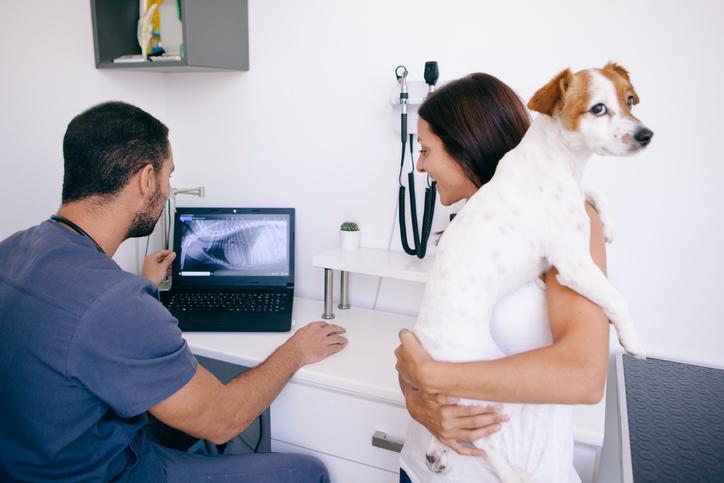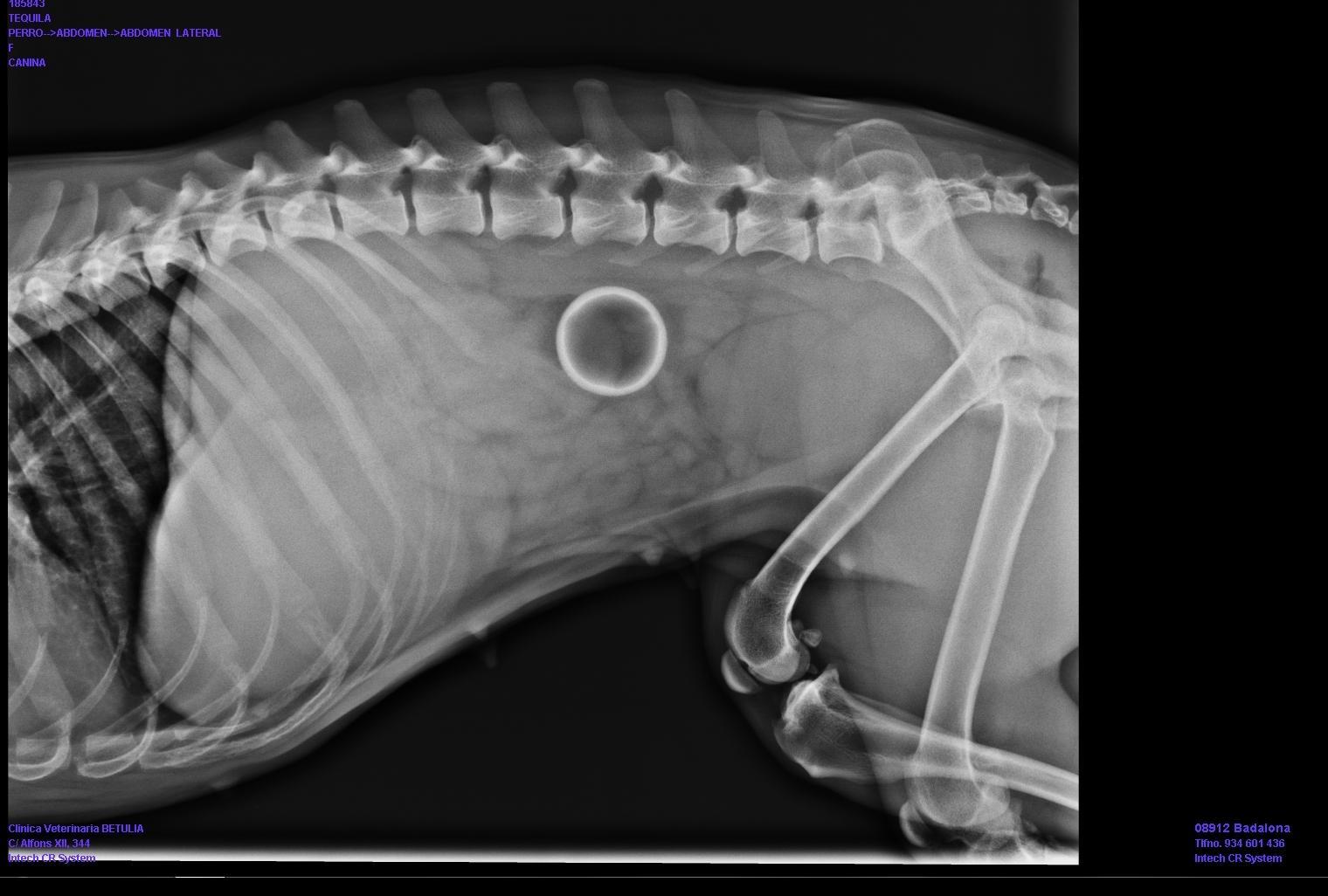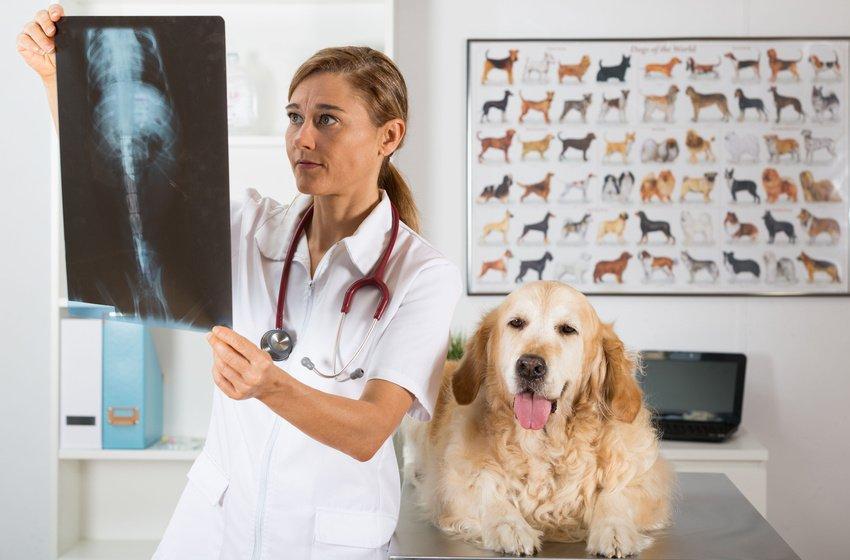Intestinal Blockage in Dogs - Symptoms and Treatment



See files for Dogs
Whether out walking or in the home, our dogs can ingest the strangest objects. Despite the fact they are inedible, many of the objects which seem irresistible to our dog don't appear to be appetizing in the least. Since they can be broken down in the dog's mouth, many of these merely pass through their system undigested. Some may even pass through the dog's gastrointestinal system and emerge completely intact. This is commonly the case with pieces of fabric the dog may ingest. Unfortunately, being indigestible means many foreign bodies cannot be broken down and result in an intestinal blockage in dogs.
Although the ingestion of foreign objects can be a common cause of bowel obstruction in dogs, it is not the only one. AnimalWised looks at theses other causes, as well as the symptoms and treatment of gastrointestinal obstruction.
What is intestinal obstruction in dogs?
Also known as a bowel obstruction or intestinal obstruction, an intestinal blockage occurs when something is preventing the normal passage of digested matter through the large or small intestine. These blockages can be either partial or total. Although both can cause issues, generally speaking the larger the blockage the worse the clinical picture. There are two main types of intestinal blockage in dogs:
- Mechanical obstruction: when something is physically preventing the passage of digested food through the intestine. Most commonly occurs in the small intestine and is considered a frequent cause of acute vomiting in dogs[1].
- Functional obstruction: when the bowel does not function properly for whatever reason, causing the cessation of peristaltic flow and the accumulation of digested matter to form a blockage.
When the cause of the intestinal blockage is mechanical, there are many risk factors. For example, if the object has sharp sides, it can cause lacerations to the internal tissue of the dog's gastrointestinal tract. If they result in internal hemorrhaging, it can be potentially fatal.
For functional obstructions of the intestines, there will be an underlying problem or condition which results in the blockage. Once this underlying issue is treated, it should return the flow of digestion. Although ingestion of foreign objects is a common cause of mechanical blockage, there are also underlying health issues which can cause a physical obstruction in the intestines.
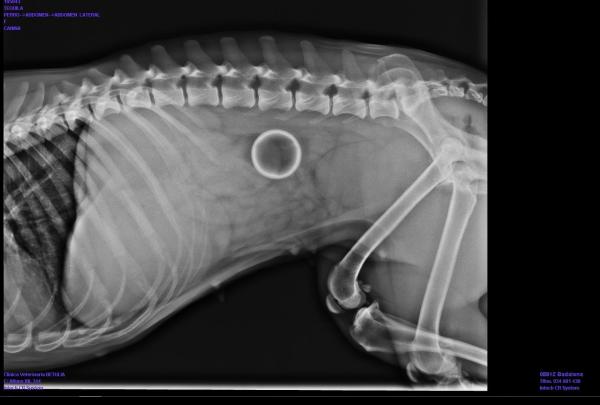
Causes of intestinal blockage in dogs
As we have explained above, there are two main types of bowel blockage in dogs. We find out some of the most common reasons why a dog's intestines can become blocked, according to type:
Mechanical intestinal obstruction in dogs
- Foreign body: since dogs use their mouths to explore their environment, it is common for them to ingest something they shouldn't. This can even happen when they are playing with an object and fragments that break off can be ingested accidentally. The sharper and larger the object, the more potential damage can occur.
- Tumor: intestinal blockages can be intraluminal or extraluminal. When a foreign object obstructs the GI tract, it does so within the organ (intraluminal). Something can also press against the outside of the intestine and causes the blockage (extraluminal). The latter is the case with tumors. Whether benign or malignant, the abnormal growth of tissue can press against the intestine and restrict flow.
Functional intestinal obstruction in dogs
- IBS: inflammatory bowel disease in dogs has many potential causes, but they all result in the chronic inflammation of the intestinal walls. It is this inflammation which causes the blockage. They can be related to a variety of disorders which are often related to the immunity status of the dog.
- Infections: although an initial infection can cause chronic IBS in dogs, it is also a possible cause of acute inflammation which blocks the intestines. The immune system of a dog reacts against the pathogens which cause an infection, usually bacterial, viral or fungal. The inflammation of the intestines causes the blockage. Infection in other parts of the abdomen can also cause extraluminal pressure which leads to obstruction.
- Hernias: when a part of the intestine breaks through its normal abdominal cavity, it can lead to a blockage. This can be because the segment of intestine is folded over on itself, causing a strangulated obstruction. Can also occur when the blood supply to this part of the intestines is compromised. The underlying causes can be traumatic or even hereditary, as is the case with inguinal hernias in dogs.
- Intussusception: when part of the intestine folds over onto the successive section. It is more common a problem for the small bowel than the large intestine. It can be related to both hereditary and acquired disorders. There is risk of perforation and it can lead to fatal peritonitis in dogs if not addressed promptly.
- Medications: the use of certain drugs can result in various side effects. One common side effect of many drugs can be obstruction. For example, the antiemetic drug known as metoclopramide for dogs can result in intestinal obstruction due to the slowing of GI movement[2].
Symptoms of intestinal blockage in dogs
Since both mechanical and functional obstructions can be caused by underlying conditions, there will be symptoms specific to these disorders. The below symptoms are some of the symptoms which are specific to the blockage itself and can occur whether the obstruction is partial or total:
- In partial intestinal obstructions the dog will have intermittent vomiting and/or diarrhea. This picture can last for weeks.
- Complete intestinal obstructions will cause the dog a sudden onset of acute abdominal pain and constant vomiting. In these cases the dog cannot defecate or expel gases.
- Vomiting caused by obstructions in the first part of the small intestine is projectile. Those that affect the last part cause abdominal distension and the vomit is brown in color and smells like feces.
- If the obstruction affects the blood supply to the intestine, intestinal strangulation occurs. This situation is capable of causing gangrene in the affected portion within a matter of hours. The dog's condition will deteriorate rapidly. We will see lethargy and other symptoms similar to when the dog goes into shock.
- Intestinal obstruction can cause acute gastric dilatation volvulus (GVD), commonly known as gastric torsion or bloat. In this picture, we will see the dog's belly has become hard and they will have concurrent, pain, nausea, restlessness, respiratory distress, pale mucus membranes and other symptoms.
Any symptom such as those mentioned is a reason for veterinary consultation. In the next section we will see what to do in case of intestinal obstruction in dogs.
Treatment of intestinal blockage in dogs
To detect an intestinal obstruction in dogs, the vet can do an x-ray of the abdomen[3]. With this diagnostic tool, the veterinarian will be able to observe the rate of distension of the intestines and any gas accumulation which has occurred. Treatment of an intestinal obstruction will be to remove the blockage. The treatment will likely require surgical intervention.
It can be possible to alleviate the obstruction using drug therapy, but this will depend on the nature of the obstruction itself. If the cause is due to the side effects of a drug, the cessation of this drug therapy can stop the blockage. However, sometimes the blockage can remain even after the dog stops taking the medication and surgical intervention will still be required.
The vet may also need to remove a part of intestine if it is sufficiently damaged and carry out a resection. The cost of the intestinal blockage surgery will depend on the extent of the problem and the length of time the dog will need to be hospitalized, Unfortunately, this can cost up to thousands of dollars, depending on various factors.
Home remedies for intestinal blockage in dogs
There are certain health conditions which can help promote gastrointestinal movement such as a soft diet for dogs with kidney failure. However, constipation is not the same as an intestinal blockage. Once the the blockage occurs it provides a serious threat to the dog's organism. The dog's clinical picture can change rapidly and the issue can become fatal.
For this reason, there are no home remedies for an intestinal blockage in dogs. We will need to take the dog to a veterinarian for diagnosis and they will administer the correct course of treatment. It should go without saying that we should never try to make an incision and remove the blockage ourselves.
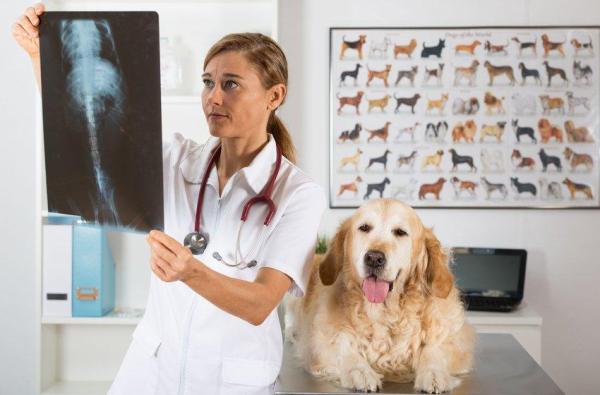
Prognosis of dogs with intestinal blockage
Intestinal obstruction in dogs is a treatable problem. In most cases, can be resolved by a veterinarian. This is only when intervention occurs promptly. If our dog suffers from a complete intestinal obstruction and does not receive assistance, they will die since. The interruption of intestinal transit prevents the animal from defecating, causes vomiting and can quickly damage the intestine to the point of gangrene. This results in shock and death.
We must go to our veterinarian if we observe that our dog presents any of the aforementioned symptoms. Once the obstruction is resolved, they will likely need some dietary changes to help their intestines recover.
Prevention of intestinal blockage in dogs
There are various ways we can help prevent intestinal blockage in dogs:
- Avoid foreign objects: this means not leaving objects around the home they can ingest and being vigilant when we are walking outside.
- Proper diet: ensure your dog has the right diet for their specific needs as it can help avoid various gastrointestinal disorders.
- Suitable exercise: this means providing enough exercise for the dog to be healthy, but not overdoing it. In the latter case, it can influence problems such as hernias in dogs.
- Preventive medicine: ensuring your dog has suitable deworming and vaccination schedules as well as regular checkups can help avoid health problems which lead to intestinal obstruction.
This article is purely informative. AnimalWised does not have the authority to prescribe any veterinary treatment or create a diagnosis. We invite you to take your pet to the veterinarian if they are suffering from any condition or pain.
If you want to read similar articles to Intestinal Blockage in Dogs - Symptoms and Treatment, we recommend you visit our Other health problems category.
1. Finck, C., D'Anjou, M. A., Alexander, K., Specchi, S., & Beauchamp, G. (2014). Radiographic diagnosis of mechanical obstruction in dogs based on relative small intestinal external diameters. Veterinary radiology & ultrasound: the official journal of the American College of Veterinary Radiology and the International Veterinary Radiology Association, 55(5), 472–479.
https://doi.org/10.1111/vru.12153
2. Yalcin, E., & Keser, G. O. (2017). Comparative efficacy of metoclopramide, ondansetron and maropitant in preventing parvoviral enteritis-induced emesis in dogs. Journal of veterinary pharmacology and therapeutics, 40(6), 599–603.
https://doi.org/10.1111/jvp.12396
3. Miles, S., Gaschen, L., Presley, T., Liu, C. C., & Granger, L. A. (2021). Influence of repeat abdominal radiographs on the resolution of mechanical obstruction and gastrointestinal foreign material in dogs and cats. Veterinary radiology & ultrasound: the official journal of the American College of Veterinary Radiology and the International Veterinary Radiology Association, 62(3), 282–288.
https://doi.org/10.1111/vru.12953





